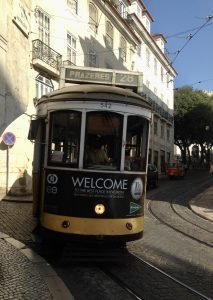Want to travel but don’t have the money? It’s not true that you need bags of money to see the world, I promise you. Take it from a seasoned, solo traveller who refuses to pay single supplements to tour companies simply because she chooses to travel alone. So… how can you travel on a budget when you don’t have a lot of spare cash?
Start with good planning
Two things are likely to cost the most: flights and accommodation. With a little forward planning, they need not be that expensive, so you can travel on whatever your budget may be.
- Avoid peak season. If you can avoid peak times, you will find much better deals. Travelling during the shoulder or off seasons means cheaper travel and accommodation deals and fewer tourists. While the weather may be a little more hit and miss, it’s usually not too different during shoulder season. Some destinations, such as Ecuador, California in the USA, or parts of Colombia, don’t have much seasonal variation at all. Check out the 6 Steps to Choosing Your Next Travel Destination for more help. And if it does rain? So what? Rainy days are great for exploring museums or galleries or for chilling out with a good book or movie.
- Shop around. Unless you’re booking an all-inclusive resort holiday, it’s often cheaper to do it yourself. (If resorts are more your thing then be prepared to spend more since they are not cheap, but keep an eye out for any deals.) Start looking for flights well in advance and track prices to see when they drop. Most apps will have a price-alert option, you just need to sign up.
- Book it when the price is right for you. Once you have found the flight that fits your travel budget and dates, book it! You want to be flexible enough to find a good deal, but you also want to be firm once you’ve found it. Avoid buying the flexible ticket that allows lots of changes, as that comes with steep price increases. Instead, get some travel insurance that will cover last-minute problems. More on that later.
- Be smart about accommodation. Where you choose to stay is a very personal choice. But remember, as long as it’s clean and comfortable, all you truly need is a bed and a shower. You’re unlikely to be spending a lot of time there, so don’t waste too much money on it.
Personally, I love hostels, and most now also offer private rooms. You get comfort, cleanliness and character at a fraction of the cost. Budget hotels are also everywhere, offering plenty of choice. You can always go for an Airbnb or homestay option as well. Find out more on the pros and cons of accommodation options.
My pro tip on accommodation: book somewhere that offers free cancellation and keep looking for any last-minute deals that may pop up. Set a reminder to cancel what you’ve reserved so you don’t get charged for two places if you do find somewhere cheaper or better.
When you get there
The next big travel budget items are what you spend at your destination. There are a few things you can do when you arrive that will keep your costs down. Here are my top tips:

- Self-catering or eating out? No one wants to spend their hard-earned time off stuck in the kitchen cooking. But hear me out. A small kitchenette can save you money without too much effort. Making your own breakfast can save you a lot compared to eating out every morning, or even compared to the hotel’s breakfast. Personally, I’ll make my own breakfast and then have a coffee in a local cafe. It’s cheaper, still gets me out and supports the local economy.
Another idea is to make sandwiches, wraps or salads that you can take with you on days when you’re out sightseeing, hiking or at the beach. And always carry your own refillable water bottle (find one with a built-in filter for questionable tap water). It saves you money, cuts down on single-use plastic, and you can refill it in any restaurant or cafe while you’re out and about. - Shop at local markets. In most places around the world there will be a farmers or daily market. Buy local produce for your breakfasts and lunches, where it’s guaranteed to be fresh and cheaper. Local supermarkets are also a good option, as are bakeries and delis.
- Street food. Fresh, hot, local and cheap. What’s not to like? I admit it took me a while to see past the fear of street food, but I’m very much a convert. Street food (like local markets) is one of the best ways to truly experience another culture. If you’re still unsure, maybe this will help: Street food: to eat or not to eat?
- Embrace public transport. The temptation to hang on to our home comforts and hire a car or only travel by taxi or rideshare can be great. But public transport is cheap, and most places will have a decent network that can get you to where you want to go. It’s also yet another way to get a real experience of a place. Intercity and even cross-border trains and buses are also often cheaper and less hassle than flying.
Some local transport routes also double up as tourist ones. If you’re ever in Lisbon, Portugal, for example, take tram 28 from end to end. It will wind through the old city, giving you a glimpse of hillside neighbourhoods while you rub shoulders with Lisboetas on their way to work.

- Forget the souvenir gifts. In my culture it’s traditional to bring something back for your family and friends. But that can very quickly add up to a lot of money, not to mention having to carry it all back! I stopped buying gifts for the sake of it a long time ago. Instead, my friends and family enjoy my travel stories and experiences, and I get to spend more time with them – and relive my trip! If I see something I know is perfect for someone, I may get it. It will usually be in a local market or from a local artist or business rather than a big department or chain store. That usually makes it cheaper too – bonus! If you really need to do something, send a postcard.
- Get travel insurance. This is a must wherever you are going, and especially if you are planning to travel to the USA. Travel insurance will cover you for any last-minute cancellations or delays, lost luggage, theft, accommodation problems and, perhaps most importantly, illness or accidents. What may seem like an extra cost could actually save you a lot of money if you ever need to use it. I use and recommend SafetyWing, which has options for short trips and long-term digital nomad adventures.
Bonus tip
This one is aimed at travellers living in the USA, where there are numerous companies offering such rewards. Collecting points or miles is a quick way of racking up benefits that you can put towards your next trip. Points and miles are a form of currency, accumulated when you use your credit card. Any purchase you make or bill you pay using a rewards credit card will collect points (or miles, depending on the credit card you have). These can then be used to pay for your next flight or hotel room (either in full or in part).
Shop around for a rewards credit card that will help you pay for what you want – hotels or flights – and start collecting today. You may be surprised how quickly points can add up if you use it for your day-to-day costs. The Points Guy website explains this in more detail and can help you find the right card for you.
Wherever you go, whatever you do and however you choose to travel, there are always budget options. You just need to be open to the possibilities. Isn’t that what travel is all about?
Post updated June 2025
